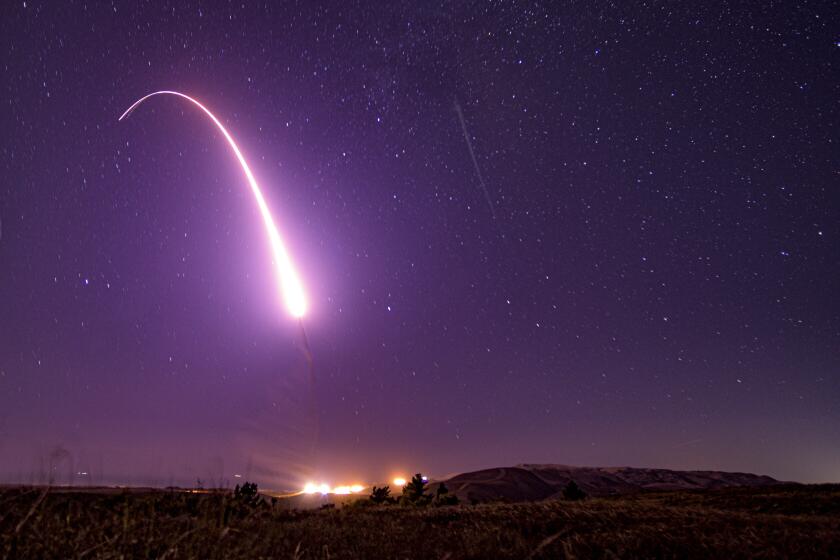Abuse Report Tests Boston Catholics’ Faith in Leaders
- Share via
SHARON, Mass. — In the summer in this comfortable community south of Boston, Father Robert Bullock turns his small white church into what he calls a “liturgical institute,” where worshipers talk about the Scriptures and tackle social issues.
On Sunday, the 74-year-old Roman Catholic priest believed he had no choice but to focus on the report issued last week by Massachusetts Atty. Gen. Tom Reilly that examined six decades of sexual abuse by priests in the Boston Archdiocese.
“Is there a connection between what we do here -- how we listen, how we pray, how we gather -- and how we respond to this report?” Bullock asked the congregants who filled Our Lady of Sorrows church.
He answered the question himself: “I think there is.”
Catholics and non-Catholics are mulling over the meaning of the 76-page report, which followed 16 months of investigation into a scandal with worldwide reverberations. Reilly’s conclusion that more than 1,000 young victims likely had been abused by 250 priests and others in the archdiocese since 1940 followed a grand jury inquiry, hundreds of interviews and an exhaustive examination of 30,000 pages of the archdiocese’s records.
Many in Boston reeled at what amounted to the first official tally of sexually abusive behavior within the church. Reilly deemed the figures “staggering,” while conceding that the number of victims in the archdiocese is probably far higher than his office could calculate.
“Any time I am at a public function,” the attorney general said, “someone comes up to me and says: ‘It happened to me.’ ”
Many survivors’ groups have expressed outrage that Reilly concluded he could not bring criminal charges against church leaders who shielded abusive priests because Massachusetts law was inadequate until last year. A delegation of victims and their advocates met with Reilly after the report was made public to demand a more detailed explanation.
Others have questioned the timing of the report’s release -- the archdiocese is to install a new archbishop Wednesday. What kind of message, many wondered, was Reilly sending to Archbishop-elect Sean Patrick O’Malley?
Jim Post, a Boston University professor who helped organize the Catholic lay group Voice of the Faithful, said that by illuminating priests’ misdeeds and acknowledging that the archdiocese is not yet free from abuse, the report stood as a warning to O’Malley.
“I believe his honeymoon is going to be measured in nanoseconds,” Post said. “The expectations are very, very high.”
But Bill Gately, chairman of the Massachusetts chapter of SNAP -- the Survivors Network of Those Abused by Priests -- said anyone who assumed that things would get better in the Boston Archdiocese because the abuses were written down was in denial.
“I want to call it laziness, or complacency, or maybe it’s just that some people want it to be over,” Gately said. “The numbers are so vast, they almost lose their relevancy for some people.”
Gately said he worried that the official report would provide an artificial sense of resolution for some Catholics -- persuading them that now that law enforcement has looked into the problem, the crisis is over.
“They feel like their religious journey has been detoured for a year and a half, and now they have a new archbishop coming and they want to get back on track,” Gately said. “The thing is, I don’t think they are going to recognize the road once they get back on it. This is not the same church we were in two years ago.”
The church in Boston in fact has changed in many ways since the scandal exploded 19 months ago. Attendance in the nation’s fourth-largest archdiocese has dropped by 14%, according to church spokesman Father Christopher Coyne. Donations over the last year decreased by about 7%, a figure that Coyne said was not larger because some people increased their giving to make up the difference.
The “big hit,” according to Coyne, was the annual cardinal’s appeal, a fund-raising effort that fell $8.5 million short of its $16-million goal. Cardinal Bernard Law resigned in December after pressure mounted because he personally had protected some abusive priests. Finances in the archdiocese have been so tight that five parochial schools have been closed.
Addressing his parish, Bullock stressed that because of the sexual abuse crisis, the church in Boston is in a state of flux. “When people ... are going through change or crisis, the tendency is to get through it as quickly as possible,” said Bullock, a founder of a group organized in response to the crisis called the Boston Priests’ Forum.
But as Bullock urged his parishioners to discuss the attorney general’s report, only Barbara Walsh accepted the challenge. Walsh stood and accepted Bullock’s hand-held microphone -- a gesture that made the Sunday service seem as much like a talk show as a religious event.
“We must somehow convey to the hierarchy that they must lift their heads out of the sand,” said Walsh, a hospice nurse. “We must no longer operate in the kind of secrecy that allowed these abuses to take place for so many years. We must deal with this shame openly, and no longer try to sweep it under the rug.”
Walsh said the report reminded her that many Boston Catholics share a powerful sense of outrage that is aimed directly at church officials.
“I am a mother and a grandmother,” Walsh said, promising she would not stand by to “see this happen to one more child.”
This reaction was just what Bullock was hoping for.
“We are all finding our voice now -- the voice of responsibility,” he said.
More to Read
Sign up for Essential California
The most important California stories and recommendations in your inbox every morning.
You may occasionally receive promotional content from the Los Angeles Times.










